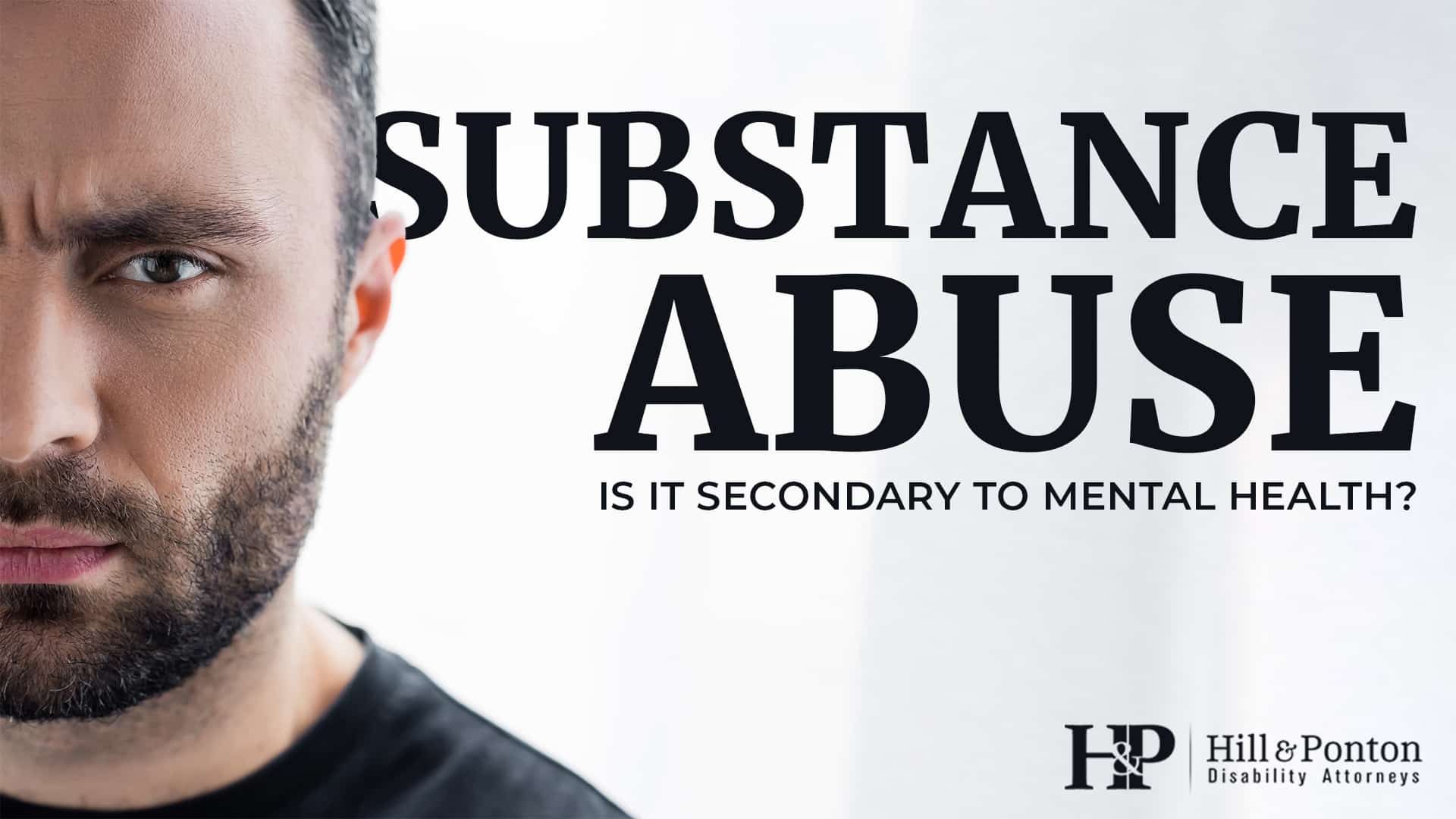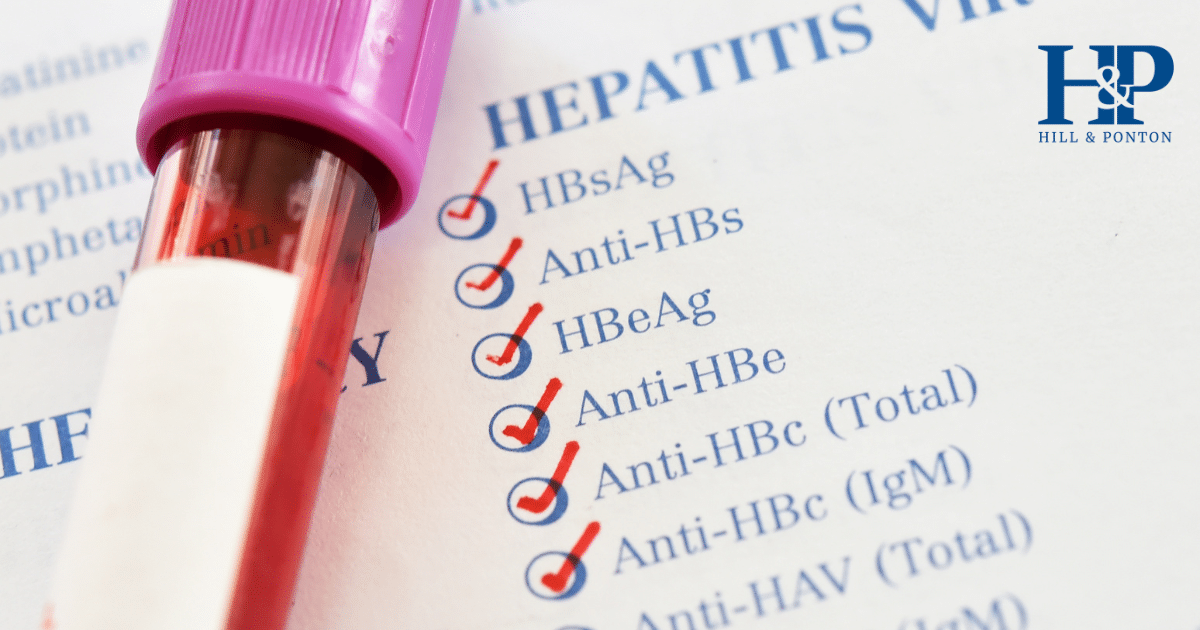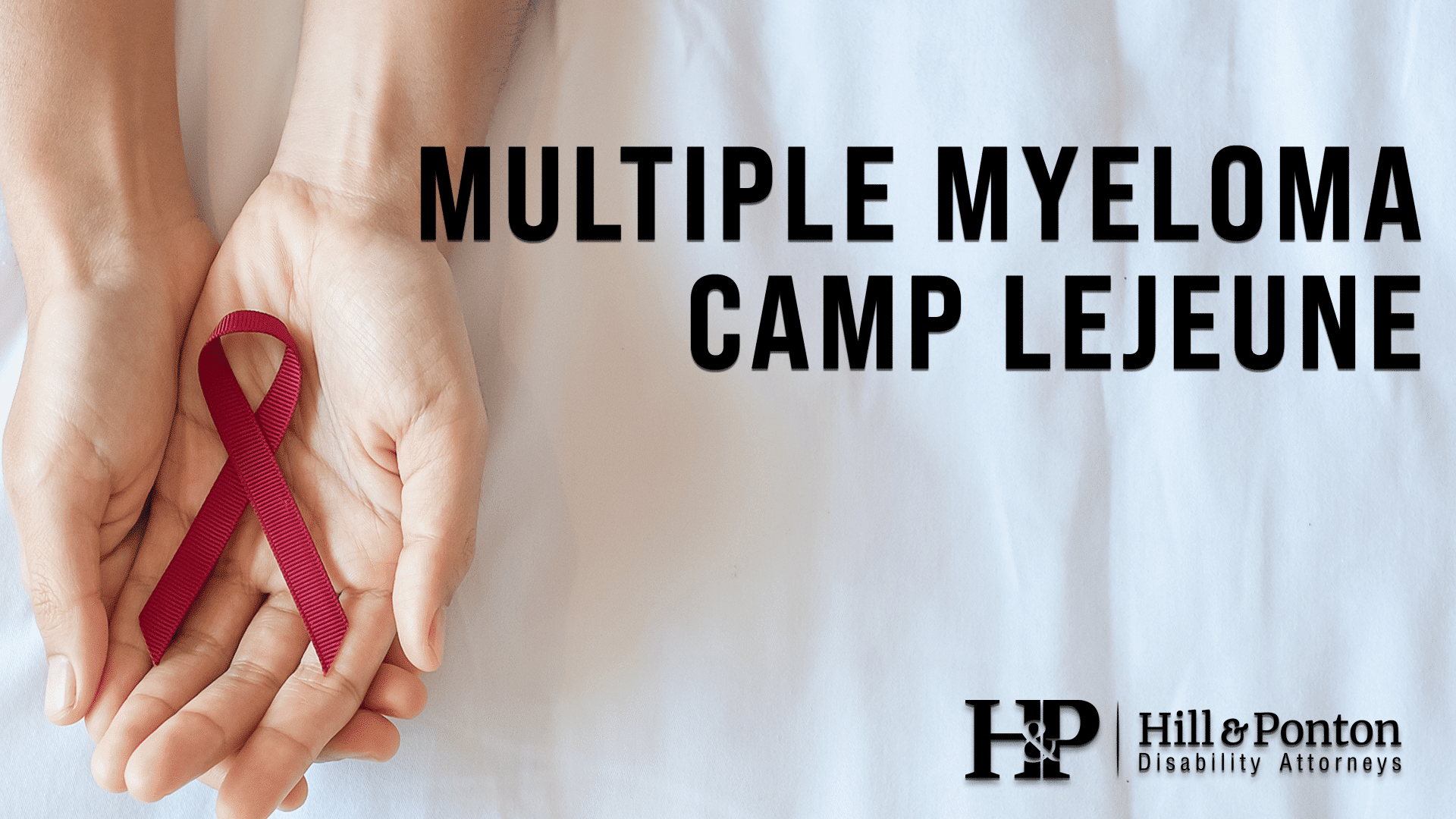In 2015, over 1.3 million veterans were receiving disability compensation for a mental related condition such as PTSD, general anxiety disorder, major depressive disorder, etc.
These conditions, either directly service connected or secondary to another service connected condition represented almost 7% of the total of all veterans disability compensation claims paid out by the Department of Veterans Affairs at an average rating level of 30%. Most veterans also receive a 100% rating for a mental health condition compared to any other condition, almost 200,000 compared to the next highest condition at just over 30,000 for musculoskeletal conditions.
However, there is a secondary condition that many veterans are unaware of related to their mental health condition that may often either cause them to be denied service connection and/or cause other major problems in their lives such as homelessness, loss of jobs and relationships, and physical illnesses.
This is substance abuse.

What is substance abuse?
Substance abuse includes illicit or illegal drugs, alcohol, and prescription painkillers or narcotics that someone becomes addicted to regardless of any pain they are treating such as opiates.
Primary and Secondary Diagnoses for VA Disability Benefits
Many psychiatrists and psychologists will diagnose a veteran with a mental health condition such as Post-traumatic stress disorder and a substance use or abuse disorder, including alcohol, under what is known as an Axis I.
Axes are different diagnoses levels:
- Axis I is for clinical disorders such as mental health and substances
- Axis II is personality disorders
- Axis III is medical conditions
- Axis IV is social stressors (Axis V was general functional ratings which is no longer used)
Under an Axis I there can be many diagnoses listed together.
If there is more than one disorder listed on the Axis I, then it is important to determine if one is secondary to another. Usually, the first disorder is primary and the second is secondary. For example, it may look like this: Axis I: Major depressive disorder, ETOH abuse disorder.
This would imply in most clinical areas that the alcohol abuse was secondary to the depression, in other words, the depression caused or led to the alcohol abuse. However, not all psychiatric providers abide by this form of diagnosing so it is up to the veteran to get clarification in writing.

How to Determine if Substance Abuse is Secondary to Mental Health
One way a veteran can help their treatment provider determine if their substance or alcohol use is secondary to their mental health condition is by:
- Providing a timeline or history
- Identifying when the substance or alcohol use started or became a problem
- Comparing it to when symptoms of a mental health problem began
Be careful not to compare the use to when there was a diagnosis because often veterans are not diagnosed with a mental health condition until after there has been a substance or alcohol problem for quite a while.
In fact, substance and alcohol use are often catalysts for finding mental health problems among veterans as many veterans do not report mental health symptoms during active duty due to the stigma attached and risks of losing their careers. Drinking with their fellow servicemembers is much more socially acceptable, unfortunately, than seeking out mental health treatment in the military.
Veterans should review symptoms with a mental health provider and check with family members to find out when they first started exhibiting symptoms and compare it to when they first started using alcohol or substances to ensure the timeline is accurate.
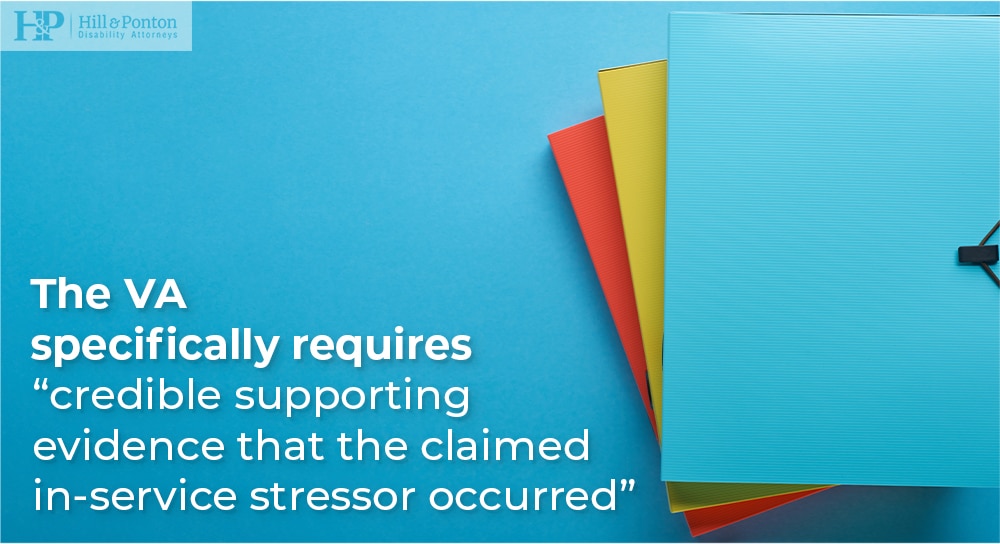
Why is it Important to Know Which Disability is Primary?
The collateral evidence is usually more accurate than the veteran’s own memory of symptoms, as if it often difficult to see symptoms in yourself as opposed to others, especially subtle behavior changes.
Most veterans who have a substance or alcohol problems will have an undiagnosed mental health disorder that precipitated the use disorder, and they should:
- Get proper treatment
- File for disability compensation
First, substance and alcohol use disorders cannot be treated properly and successfully if there is an underlying mental health disorder and it is not being treated as well. The substance or alcohol use disorder is often a coping mechanism for the mental health problem, and when the mental health condition continues to be untreated, the veteran will continue to use alcohol or substances to treat the condition on their own and may fall deeper into drug addiction.
The link between Mental Health Issues and Substance Use
The VA has shown that there is a strong correlation between mental health and substance and alcohol use disorders:
- More than two of ten veterans with PTSD also have a substance use disorder;
- War veterans with PTSD and alcohol problems tend to binge drink in response to bad memories of combat trauma;
- Almost one in three veterans seeking substance abuse treatment also has PTSD;
- The amount of veterans who smoke is almost double for those with PTSD compared to those without a PTSD diagnosis; and
- One in ten veterans returning from the wars in Iraq and Afghanistan have a problem with substances and/or alcohol.
Filing a claim for compensation can help provide options for veterans with co-occurring mental health and substance use disorders. First, a medical evaluation can be conducted to determine the extent and primary diagnosis. An independent medical exam can often be utilized if a VA C&P examiner decides that the veteran’s substance use disorder precipitates their mental health disorder.
Most psychiatric treatment providers working with co-occurring disorders understand that there is usually a mental health disorder that causes the need for coping mechanisms, which is what the substance and alcohol use disorder usually stems from, a need to find a way to cope with something. Ensuring that an evaluation is done by a specialist who understands the concepts of co-occurring disorders is vital to a veteran’s claim.
Second, once compensation has been awarded, the veteran is entitled to health care treatment as well as monetary compensation. Most veterans with a co-occurring disorder have difficulty finding or keeping a job so financial stress is important to address.
Also, mental health disorders often lead to suicide and six of ten veterans who attempt suicide were not getting medical or mental health treatment, so having a treatment provider or a primary care provider is essential to keeping veteran’s safe and alive.
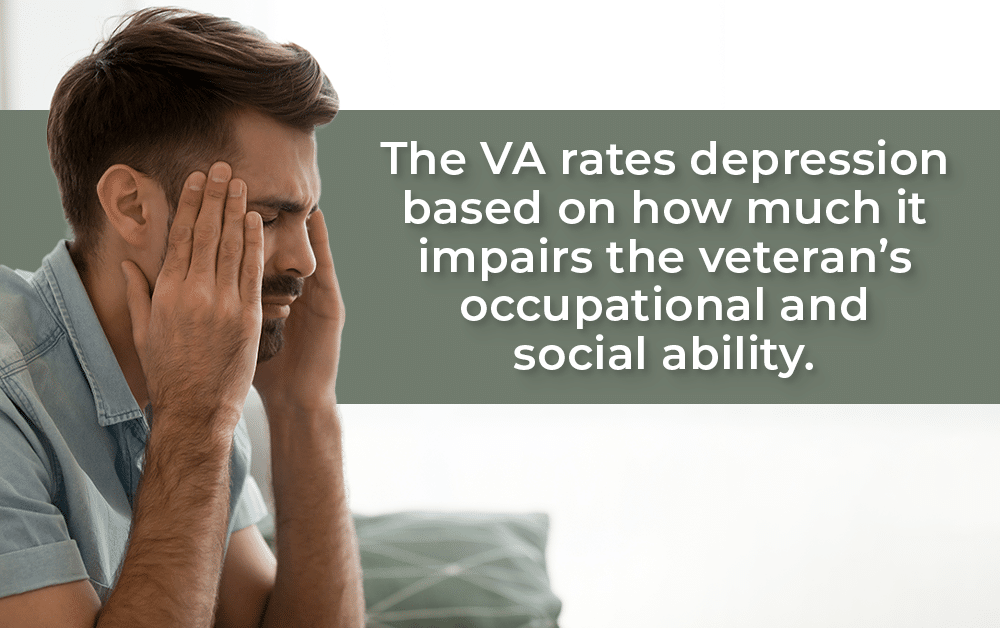
Drug addiction from VA-prescribed medication
Another addiction issue is if a veteran is being treated for pain and becomes addicted to medication used to treat the pain. If the treatment is from the VA, this is also subject to compensation and the veteran should file a claim for compensation based on service connection for injuries caused by VA healthcare.
Keeping our veterans safe is vital to our mission. This blog, among the many we have published that discuss ways for veterans to address their mental health conditions, is just one way we try to get the message out.
Co-occurring disorders involving substance and alcohol use are among the most misunderstood and stigmatized disorders veterans suffer from. If you know a veteran who is suffering from these, please ask them to get help.
Does substance abuse affect Social Security Disability benefits?
In both Social Security and VA Disability law, usually, the issue is raised because a disabled Social Security claimant or veteran is using drugs and/or alcohol at the same time they are trying to pursue a disability claim. When asked about drugs and/or alcohol, some of my clients are often astonished that there is even mention of drugs or alcohol in their file. So, in both Social Security and VA cases, the question usually becomes: now that my record mentions drugs and/or alcohol, what can or should I do about it?
In the Social Security context, a problem with drugs and/or alcohol is almost always fatal to a successful outcome in the case. The law says that the Social Security Administration (SSA) will look to see if alcohol or drug use is a contributing factor that is material to the disabling impairment(s). In other words, would SSA still find the person disabled if he/she stopped using drugs or alcohol. If the person would still be disabled if he/she stopped using drugs or alcohol, technically, he/she should be awarded benefits. However, this determination is normally not as simple as it sounds.
For example, imagine a person who suffers from depression and an alcohol or drug problem. The person is using alcohol or drugs to help cope with the depression, because in his/her opinion, the depression medications prescribed by the doctor do not seem to work. This scenario raises a few issues. First, it is important to know whether or not the person has been advised to stop drinking or using drugs by the doctor. If the doctor has advised the person to stop and they continue to engage in the behavior, SSA will likely determine that the person is ignoring medical advice. In other words, they are non-compliant with the doctor’s orders. Other considerations are also whether the person is using v. abusing, is it prescription drugs or illegal drugs, etc.
In our experience, most judges will refuse to grant Social Security Disability Benefits to anyone who is abusing alcohol and/or drugs, including prescription drugs. If there are errors or misstatements in the medical record regarding alcohol and/or drugs, it is crucial that the patient talks with his/her doctor and get the record corrected as soon as possible so as not to negatively affect the Social Security case. If the allegations are true, the Social Security claim will likely be denied if the person does not stop the drugs or alcohol right away.
Filing for VA benefits with substance abuse
In the VA context, substance abuse is viewed in somewhat of a different light. Unlike Social Security Disability, an issue with drugs and/or alcohol is not always fatal to the success of a VA disability claim. The VA will evaluate whether or not the veteran is disabled due to ‘willful misconduct’ which is the proximate or direct cause or the claimed disabilities. Willful misconduct is defined in the VA regulations as “an act involving conscious wrongdoing or known prohibited action.” If the VA determines that a disability is due to willful misconduct, the veteran is not eligible for compensation or pension for any disabilities related to the misconduct. However, the veteran is still eligible to claim compensation or pension for disabilities not related to the misconduct.

A common example that arises in VA disability law is veterans with PTSD and alcohol or drug issues. As mentioned previously, there is research that indicates that many veterans use drugs and/or alcohol as a coping mechanism for serious psychological trauma they have suffered as a result of military service.
Assuming that the veteran can establish that he/she suffers from service connected PTSD, and if he/she can prove that the alcohol or drug abuse is caused by or secondary to the PTSD, the VA regulations do allow for secondary service connection of the substance abuse disorder. Service connection under this theory would also extend to any other conditions that develop as a result of the substance abuse, such as cirrhosis of the liver. So in other words, secondary drug or alcohol abuse in this context would not be barred from service connection based on willful misconduct.
Can a veteran get service connected if they have a problem with substance use?
Of course not every veteran with substance abuse and mental health issues will be able to obtain service connection for the abuse; however, the point is that under VA disability law, a successful outcome is still possible.
In sum, the bottom line is that drugs and alcohol do matter. If allegations of drugs and/or alcohol are false, it is crucial that the veteran or Social Security claimant speak to his/her doctor right away to get the record corrected as soon as possible. Lastly, it should be noted that if there is a “past history” of abuse, the fact that the abuse is in the past needs to be clarified in the record as well.
Case Law and Scientific Evidence of Mental Health Conditions correlated with Substance Abuse Disorders
Imagine a veteran with service-connected diabetes whose diabetes led to the amputation of his foot. It would seem absurd for the VA to deny his claim. However, many veterans with service-connected mental health issues are routinely denied service-connection to disabilities secondary to substance abuse. Not only has substance abuse been clinically and scientifically seen as a symptom of mental illness for many years, but when the VA rejects these claims, they are breaking their own rules.
Studies show, of VA patients with mental illness, around 21 to 35% also have co-occurring substance abuse disorders. While the rate of substance abuse varies from diagnosis to diagnosis (schizophrenia and bipolar disorder have the highest rates), there is an increase in substance abuse with most mental illnesses.
In 2001, the Federal Circuit heard the case of Allen v. Principi, where a veteran with PTSD was fighting for an increased rating for his PTSD, due to the effects of his substance abuse socially and occupationally. The VA responded that substance abuse could NOT be service-connected, either as a primary disability or as secondary to mental illness. However, the court found that the law:
“does not preclude compensation for an alcohol or drug abuse disability secondary to a service-connected disability or use of an alcohol or drug abuse disability as evidence of the increased severity of a service-connected disability.” But cautioned that: “veterans can only recover if they can adequately establish that their alcohol or drug abuse disability is secondary to or is caused by their primary service-connected disorder …where there is clear medical evidence establishing that the alcohol or drug abuse disability is indeed caused by a veteran’s primary service-connected disability, and where the alcohol or drug abuse disability is not due to willful wrongdoing.”
It is the phrase “willful wrongdoing” that is often the problems in these sorts of cases, and it can be difficult to demonstrate to the VA that the substance abuse is not misconduct, but a symptom of the veteran’s mental illness. Typically, the best way to do this is with an independent medical opinion wherein the doctor provides medical research showing the clear connection between substance abuse and mental illness.
There are many disabilities that can be caused by substance abuse, and there can be damage to many parts of the body.
Alcohol’s Effects on the Body and Related Conditions
Alcohol and many other drugs of abuse can cause severe liver problems, from cirrhosis, fatty liver disease, alcoholic hepatitis, and even liver cancer.
Drug Abuse and the Body’s Neurological system
Alcohol and drug abuse can severely affect the neurological system of the body. Alcohol abuse can lead to Wernicke-Korsakoff disease, the result of thiamine (b1) deficiency that is common with alcoholism. This can result in confusion, memory and cognitive problems, problems walking, and paralysis of the nerves that control eye movement. Chronic alcohol abuse also causes peripheral neuropathy and myopathy, pain in the nerves and muscles. Many drugs of abuse can have serious and profound effects on the brain, from brain damage to strokes, and even coma.
Alcohol Use and Cardiovascular Effects
Chronic alcohol abuse is terrible for your cardiovascular system. Drinking can elevate triglycerides in the blood, and cause hypertension, anemia, stroke, cardiomyopathy, arrhythmias, and even sudden cardiac death. Drinking also tends to lead to obesity, which can aggravate cardiac problems further. Many other drugs of abuse, such as stimulants like cocaine and methamphetamines, can cause severe heart problems as well.
Alcohol/Drug Use and Cancer
Excessive alcohol use can cause cancers in many places, such as the mouth, esophagus, breast and digestive system.
There are many other complications from alcohol and drug abuse, from diabetes to even orthopedic problems caused by intoxication. Infectious diseases, such as HIV or Hepatitis C may be the result of intravenous drug use, and veterans with drug problems have gotten these disabilities service-connected in the past.
It is important for the VA to recognize that alcohol and substance abuse are NOT moral problems in those with mental illness, but are as much a part of the disease process as any other symptom. It is even more important for veterans with substance abuse problems to receive the treatment and care that they need and deserve.
